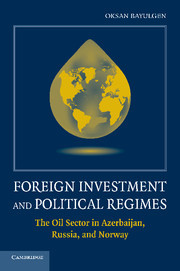Description
Foreign Investment and Political Regimes
The Oil Sector in Azerbaijan, Russia, and Norway
Author: Bayulgen Oksan
Demonstrates that the political institutions of authoritarian regimes and consolidated democracies are better equipped to create attractive policies for investors.
Language: English
Subject for Foreign Investment and Political Regimes:
Approximative price 39.35 €
In Print (Delivery period: 14 days).
Add to cart
Foreign Investment and Political Regimes
Publication date: 08-2014
Support: Print on demand
Publication date: 08-2014
Support: Print on demand
Approximative price 100.60 €
In Print (Delivery period: 14 days).
Add to cart
Foreign investments & political regimes: The oil sector in Azrbaijan, Russia and Norway
Publication date: 01-2010
290 p. · 16.1x23.5 cm · Hardback
Publication date: 01-2010
290 p. · 16.1x23.5 cm · Hardback
Description
/li>Contents
/li>Biography
/li>
Drawing on three in-depth case studies of oil-rich countries and statistical analyses of 132 countries over three decades, Bayulgen demonstrates that the link between democratization and FDI is nonlinear. Both authoritarian regimes and consolidated democracies have institutional capabilities that, though different, are attractive to foreign investors. Democracies can provide long-term stability, and authoritarian regimes can offer considerable flexibility. The regimes that have started on the road to democracy, but have not yet completed it, tend to have political institutions that provide neither flexibility nor stability. These hybrid regimes, then, also find it relatively more difficult to construct a policy environment that is attractive to foreign investments. These findings have deep implications for the link between democratization and globalization, but also how globalization may affect political, social, and economic development.
1. Introduction; 2. Political risks in oil investments: a history of antagonistic interdependence; 3. With or without democracy?: the political economy of FDI; 4. Curse or blessing?: effects of FDI on development; 5. Azerbaijan: one-stop shopping; 6. Russia: two-steps forward, one-step back; 7. Norway: icon of stability; 8. Beyond three cases and oil; 9. Conclusion.
Oksan Bayulgen is an Assistant Professor of Political Science at the University of Connecticut. Bayulgen has published numerous articles on foreign investment, oil politics, democratization, and microfinance in such journals as Communist and Post-Communist Studies, Business and Politics, and International Studies Review. She has received research grants from the Ford Foundation, University of Texas at Austin, and University of Connecticut to conduct extensive field-work in Azerbaijan, Russia, Norway, Kazakhstan and Turkey.
© 2024 LAVOISIER S.A.S.




